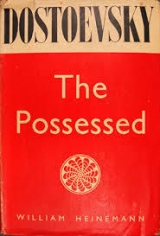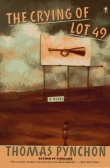
Текст книги "The Possessed"
Автор книги: Федор Достоевский
сообщить о нарушении
Текущая страница: 14 (всего у книги 49 страниц)
The speaker suddenly broke off and was turning to Lebyadkin. But Varvara Petrovna checked him. She was in a state of extreme exaltation.
“Have you finished?” she asked.
“Not yet; to complete my story I should have to ask this gentleman one or two questions if you'll allow me . . . you'll see the point in a minute, Varvara Petrovna.”
“Enough, afterwards, leave it for the moment I beg you. Oh, I was quite right to let you speak!”
“And note this, Varvara Petrovna,” Pyotr Stepanovitch said hastily. “Could Nikolay Vsyevolodovitch have explained all this just now in answer to your question, which was perhaps too peremptory?”
“Oh, yes, it was.”
“And wasn't I right in saying that in some cases it's much easier for a third person to explain things than for the person interested?”
“Yes, yes . . . but in one thing you were mistaken, and, I see with regret, are still mistaken.”
“Really, what's that?”
“You see. . . . But won't you sit down, Pyotr Stepanovitch?”
“Oh, as you please. I am tired indeed. Thank you.” He instantly moved up an easy chair and turned it so that he had Varvara Petrovna on one side and Praskovya Ivanovna at the table on the other, while he faced Lebyadkin, from whom he did not take his eyes for one minute.
“You are mistaken in calling this eccentricity. . . .”
“Oh, if it's only that. . . .”
“No, no, no, wait a little,” said Varvara Petrovna, who was obviously about to say a good deal and to speak with enthusiasm. As soon as Pyotr Stepanovitch noticed it, he was all attention.
“No, it was something higher than eccentricity, and I assure you, something sacred even! A proud man who has suffered humiliation early in life and reached the stage of 'mockery' as you so subtly called it – Prince Harry, in fact, to use the capital nickname Stepan Trofimovitch gave him then, which would have been perfectly correct if it were not that he is more like Hamlet, to my thinking at least.”
“ Et vous avez raison,” Stepan Trofimovitch pronounced, impressively and with feeling.
“Thank you, Stepan Trofimovitch. I thank you particularly too for your unvarying faith in Nicolas, in the loftiness of his soul and of his destiny. That faith you have even strengthened in me when I was losing heart.”
“ Chere, chere.” Stepan Trofimovitch was stepping forward, when he checked himself, reflecting that it was dangerous to interrupt.
“And if Nicolas had always had at his side” (Varvara Petrovna almost shouted) “a gentle Horatio, great in his humility – another excellent expression of yours, Stepan Trofimovitch –he might long ago have been saved from the sad and 'sudden demon of irony,' which has tormented him all his life. (' The demon of irony' was a wonderful expression of yours again, Stepan Trofimovitch.) But Nicolas has never had an Horatio or an Ophelia. He had no one but his mother, and what can a mother do alone, and in such circumstances? Do you know, Pyotr Stepanovitch, it's perfectly comprehensible to me now that a being like Nicolas could be found even in such filthy haunts as you have described. I can so clearly picture now that 'mockery' of life. (A wonderfully subtle expression of yours!) That insatiable thirst of contrast, that gloomy background against which he stands out like a diamond, to use your comparison again, Pyotr Stepanovitch. And then he meets there a creature ill-treated by every one, crippled, half insane, and at the same time perhaps filled with noble feelings.”
“H'm. . . . Yes, perhaps.”
“And after that you don't understand that he's not laughing at her like every one. Oh, you people! You can't understand his defending her from insult, treating her with respect 'like a marquise' (this Kirillov must have an exceptionally deep understanding of men, though he didn't understand Nicolas). It was just this contrast, if you like, that led to the trouble. If the unhappy creature had been in different surroundings, perhaps she would never have been brought to entertain such a frantic delusion. Only a woman can understand it, Pyotr Stepanovitch, only a woman. How sorry I am that you . . . not that you're not a woman, but that you can't be one just for the moment so as to understand.”
“You mean in the sense that the worse things are the better it is. I understand, I understand, Varvara Petrovna. It's rather as it is in religion; the harder life is for a man or the more crushed and poor the people are, the more obstinately they dream of compensation in heaven; and if a hundred thousand priests are at work at it too, inflaming their delusion, and speculating on it, then ... I understand you, Varvara Petrovna, I assure you.”
“That's not quite it; but tell me, ought Nicolas to have laughed at her and have treated her as the other clerks, in order to extinguish the delusion in this unhappy organism.” (Why Varvara Petrovna used the word organism I couldn't understand.) “Can you really refuse to recognise the lofty compassion, the noble tremor of the whole organism with which Nicolas answered Kirillov: 'I do not laugh at her.' A noble, sacred answer!”
“ Sublime,” muttered Stepan Trofimovitch.
“And observe, too, that he is by no means so rich as you suppose. The money is mine and not his, and he would take next to nothing from me then.”
“I understand, I understand all that, Varvara Petrovna,” said Pyotr Stepanovitch, with a movement of some impatience.
“Oh, it's my character! I recognise myself in Nicolas. I recognise that youthfulness, that liability to violent, tempestuous impulses. And if we ever come to be friends, Pyotr Stepanovitch, and, for my part, I sincerely hope we may, especially as I am so deeply indebted to you, then, perhaps you'll understand. . . .”
“Oh, I assure you, I hope for it too,” Pyotr Stepanovitch muttered jerkily.
“You'll understand then the impulse which leads one in the blindness of generous feeling to take up a man who is unworthy of one in every respect, a man who utterly fails to understand one, who is ready to torture one at every opportunity and, in contradiction to everything, to exalt such a man into a sort of ideal, into a dream. To concentrate in him all one's hopes, to bow down before him; to love him all one's life, absolutely without knowing why – perhaps just because he was unworthy of it. ... Oh, how I've suffered all my life, Pyotr Stepanovitch!”
Stepan Trofimovitch, with a look of suffering on his face, began trying to catch my eye, but I turned away in time.
“... And only lately, only lately – oh, how unjust I've been to Nicolas! . . . You would not believe how they have been worrying me on all sides, all, all, enemies, and rascals, and friends, friends perhaps more than enemies. When the first contemptible anonymous letter was sent to me, Pyotr Stepanovitch, you'll hardly believe it, but I had not strength enough to treat all this wickedness with contempt. ... I shall never, never forgive myself for my weakness.”
“I had heard something of anonymous letters here already,” said Pyotr Stepanovitch, growing suddenly more lively, “and I'll find out the writers of them, you may be sure.”
“But you can't imagine the intrigues that have been got up here. They have even been pestering our poor Praskovya Ivanovna, and what reason can they have for worrying her? I was quite unfair to you to-day perhaps, my dear Praskovya Ivanovna,” she added in a generous impulse of kindliness, though not without a certain triumphant irony.
“Don't say any more, my dear,” the other lady muttered reluctantly. “To my thinking we'd better make an end of all this; too much has been said.”
And again she looked timidly towards Liza, but the latter was looking at Pyotr Sterjanovitch.
“And I intend now to adopt this poor unhappy creature, this insane woman who has lost everything and kept only her heart,” Varvara Petrovna exclaimed suddenly. “It's a sacred duty I intend to carry out. I take her under my protection from this day.”
“And that will be a very good thing in one way,” Pyotr Stepanovitch cried, growing quite eager again. “Excuse me, I did not finish just now. It's just the care of her I want to speak of. Would you believe it, that as soon as Nikolay Vsyevolodovitch had gone (I'm beginning from where I left off, Varvara Petrovna), this gentleman here, this Mr. Lebyadkin, instantly imagined he had the right to dispose of the whole pension that was provided for his sister. And he did dispose of it. I don't know exactly how it had been arranged by Nikolay Vsyevolodovitch at that time. But a year later, when he learned from abroad what had happened, he was obliged to make other arrangements. Again, I don't know the details; he'll tell you them himself. I only know that the interesting young person was placed somewhere in a remote nunnery, in very comfortable surroundings, but under friendly superintendence – you understand? But what do you think Mr. Lebyadkin made up his mind to do I He exerted himself to the utmost, to begin with, to find where his source of income, that is his sister, was hidden. Only lately he attained his object, took her from the nunnery, asserting some claim to her, and brought her straight here. Here he doesn't feed her properly, beats her, and bullies her. As soon as by some means he gets a considerable sum from Nikolay Vsyevolodovitch, he does nothing but get drunk, and instead of gratitude ends by impudently defying Nikolay Vsyevolodovitch, making senseless demands, threatening him with proceedings if the pension is not paid straight into his hands. So he takes what is a voluntary gift from Nikolay Vsyevolodovitch as a tax – can you imagine it? Mr. Lebyadkin, is that alltrue that I have said just now?”
The captain, who had till that moment stood in silence looking down, took two rapid steps forward and turned crimson.
“Pyotr Stepanovitch, you've treated me cruelly,” he brought out abruptly.
“Why cruelly? How? But allow us to discuss the question of cruelty or gentleness later on. Now answer my first question; is it true all that I have said or not? If you consider it's false you are at liberty to give your own version at once.”
“I ... you know yourself, Pyotr Stepanovitch,” the captain muttered, but he could not go on and relapsed into silence. It must be observed that Pyotr Stepanovitch was sitting in an easy chair with one leg crossed over the other, while the captain stood before him in the most respectful attitude.
Lebyadkin's hesitation seemed to annoy Pyotr Stepanovitch; a spasm of anger distorted his face.
“Then you have a statement you want to make?” he said, looking subtly at the captain. “Kindly speak. We're waiting for you.”
“You know yourself Pyotr Stepanovitch, that I can't say anything.”
“No, I don't know it. It's the first time I've heard it. Why can't you speak?”
The captain was silent, with his eyes on the ground.
“Allow me to go, Pyotr Stepanovitch,” he brought out resolutely.
“No, not till you answer my question: is it alltrue that I've said?”
“It is true,” Lebyadkin brought out in a hollow voice, looking at his tormentor. Drops of perspiration stood out on his forehead.
“Is it alltrue?”
“It's all true.”
“Have you nothing to add or to observe? If you think that we've been unjust, say so; protest, state your grievance aloud.”
“No, I think nothing.”
“Did you threaten Nikolay Vsyevolodovitch lately?”
“It was ... it was more drink than anything, Pyotr Stepanovitch.” He suddenly raised his head. “If family honour and undeserved disgrace cry out among men then – then is a man to blame?” he roared suddenly, forgetting himself as before.
“Are you sober now, Mr. Lebyadkin?”
Pyotr Stepanovitch looked at him penetratingly.
“I am . . . sober.”
“What do you mean by family honour and undeserved disgrace?”
“I didn't mean anybody, anybody at all. I meant myself,” the captain said, collapsing again.
“You seem to be very much offended by what I've said about you and your conduct? You are very irritable, Mr. Lebyadkin. But let me tell you I've hardly begun yet what I've got to say about your conduct, in its real sense. I'll begin to discuss your conduct in its real sense. I shall begin, that may very well happen, but so far I've not begun, in a realsense.”
Lebyadkin started and stared wildly at Pyotr Stepanovitch.
“Pyotr Stepanovitch, I am just beginning to wake up.”
“H'm! And it's I who have waked you up?”
“Yes, it's you who have waked me, Pyotr Stepanovitch; and I've been asleep for the last four years with a storm-cloud hanging over me. May I withdraw at last, Pyotr Stepanovitch?”
“Now you may, unless Varvara Petrovna thinks it necessary ...”
But the latter dismissed him with a wave of her hand.
The captain bowed, took two steps towards the door, stopped suddenly, laid his hand on his heart, tried to say something, did not say it, and was moving quickly away. But in the doorway he came face to face with Nikolay Vsyevolodovitch; the latter stood aside. The captain shrank into himself, as it were, before him, and stood as though frozen to the spot, his eyes fixed upon him like a rabbit before a boa-constrictor. After a little pause Nikolay Vsyevolodovitch waved him aside with a slight motion of his hand, and walked into the drawing-room.
VII
He was cheerful and serene. Perhaps something very pleasant had happened to him, of which we knew nothing as yet; but he seemed particularly contented.
“Do you forgive me, Nicolas?” Varvara Petrovna hastened to say, and got up suddenly to meet him.
But Nicolas positively laughed.
“Just as I thought,” he said, good-humouredly and jestingly. “I see you know all about it already. When I had gone from here I reflected in the carriage that I ought at least to have told you the story instead of going off like that. But when I remembered that Pyotr Stepanovitch was still here, I thought no more of it.”
As he spoke he took a cursory look round.
“Pyotr Stepanovitch told us an old Petersburg episode in the life of a queer fellow,” Varvara Petrovna rejoined enthusiastically —“ a mad and capricious fellow, though always lofty in his feelings, always chivalrous and noble. ...”
“Chivalrous? You don't mean to say it's come to that,” laughed Nicolas. “However, I'm very grateful to Pyotr Stepanovitch for being in such a hurry this time.” He exchanged a rapid glance with the latter. “You must know, maman, that Pyotr Stepanovitch is the universal peacemaker; that's his part in life, his weakness, his hobby, and I particularly recommend him to you from that point of view. I can guess what a yarn he's been spinning. He's a great hand at spinning them; he has a perfect record-office in his head. He's such a realist, you know, that he can't tell a lie, and prefers truthfulness to effect . . . except, of course, in special cases when effect is more important than truth.” (As he said this he was still looking about him.) “So, you see clearly, maman, that it's not for you to ask my forgiveness, and if there's any craziness about this affair it's my fault, and it proves that, when all's said and done, I really am mad. ... I must keep up my character here. . . .”
Then he tenderly embraced his mother.
“In any case the subject has been fully discussed and is done with,” he added, and there was a rather dry and resolute note in his voice. Varvara Petrovna understood that note, but her exaltation was not damped, quite the contrary.
“I didn't expect you for another month, Nicolas!”
“I will explain everything to you, maman, of course, but now ...”
And he went towards Praskovya Ivanovna.
But she scarcely turned her head towards him, though she had been completely overwhelmed by his first appearance. Now she had fresh anxieties to think of; at the moment the captain had stumbled upon Nikolay Vsyevolodovitch as he was going out, Liza had suddenly begun laughing – at first quietly and intermittently, but her laughter grew more and more violent, louder and more conspicuous. She flushed crimson, in striking contrast with her gloomy expression just before.
While Nikolay Vsyevolodovitch was .talking to Varvara Petrovna, she had twice beckoned to Mavriky Nikolaevitch as though she wanted to whisper something to him; but as soon as the young man bent down to her, she instantly burst into laughter; so that it seemed as though it was at poor Mavriky Nikolaevitch that she was laughing. She evidently tried to control herself, however, and put her handkerchief to her lips. Nikolay Vsyevolodovitch turned to greet her with a most innocent and open-hearted air.
“Please excuse me,” she responded, speaking quickly. “You . . . you've seen Mavriky Nikolaevitch of course. . . . My goodness, how inexcusably tall you are, Mavriky Nikolaevitch!”
And laughter again, Mavriky Nikolaevitch was tall, but by no means inexcusably so.
“Have . . . you been here long?” she muttered, restraining herself again, genuinely embarrassed though her eyes were shining.
“More than two hours,” answered Nicolas, looking at her intently. I may remark that he was exceptionally reserved and courteous, but that apart from his courtesy his expression was utterly indifferent, even listless.
“And where are you going to stay?”
“Here.”
Varvara Petrovna, too, was watching Liza, but she was suddenly struck by an idea.
“Where have you been all this time, Nicolas, more than two hours?” she said, going up to him. “The train comes in at ten o'clock.”
“I first took Pyotr Stepanovitch to Kirillov's. I came across Pyotr Stepanovitch at Matveyev (three stations away), and we travelled together.”
“I had been waiting at Matveyev since sunrise,” put in Pyotr Stepanovitch. “The last carriages of our train ran off the rails in the night, and we nearly had our legs broken.”
“Your legs broken!” cried Liza. “Maman, maman, you and I meant to go to Matveyev last week, we should have broken our legs too!”
“Heaven have mercy on us!” cried Praskovya Ivanovna, crossing herself.
“Maman, maman, dear maman, you mustn't be frightened if I break both my legs'. It may so easily happen to me; you say yourself that I ride so recklessly every day. Mavriky Nikolaevitch, will you go about with me when I'm lame?” She began giggling again. “If it does happen I won't let anyone take me about but you, you can reckon on that. . . . Well, suppose I break only one leg. Come, be polite, say you'll think it a pleasure.”
“A pleasure to be crippled?” said Mavriky Nikolaevitch, frowning gravely.
“But then you'll lead me about, only you and no one else.”
“Even then it'll be you leading me about, Lizaveta
Nikolaevna,” murmured Mavriky Nikolaevitch, even more gravely.
“Why, he's trying to make a joke!” cried Liza, almost in dismay. “Mavriky Nikolaevitch, don't you ever dare take to that! But what an egoist you are! I am certain that, to your credit, you're slandering yourself. It will be quite the contrary; from morning till night you'll assure me that I have become more charming for having lost my leg. There's one insurmountable difficulty – you're so fearfully tall, and when I've lost my leg I shall be so very tiny.. How will you be able to take me on your arm; we shall look a strange couple!”
And she laughed hysterically. Her jests and insinuations were feeble, but she was not capable of considering the effect she was producing.
“Hysterics!” Pyotr Stepanovitch whispered to me. “A glass of water, make haste!”
He was right. A minute later every one was fussing about, water was brought. Liza embraced her mother, kissed her warmly, wept on her shoulder, then drawing back and looking her in the face she fell to laughing again. The mother too began whimpering. Varvara Petrovna made haste to carry them both off to her own rooms, going out by the same door by which Darya Pavlovna had come to us. But they were not away long, not more than four minutes.
I am trying to remember now every detail of these last moments of that memorable morning. I remember that when we were left without the ladies (except Darya Pavlovna, who had not moved from her seat), Nikolay Vsyevolodovitch made the round, greeting us all except Shatov, who still sat in his corner, his head more bowed than ever. Stepan Trofimovitch was beginning something very witty to Nikolay Vsyevolodovitch, but the latter turned away hurriedly to Darya Pavlovna. But before he reached her, Pyotr Stepanovitch caught him and drew him away, almost violently, towards the window, where he whispered something quickly to him, apparently something very important to judge by the expression of his face and the gestures that accompanied the whisper. Nikolay Vsyevolodovitch listened inattentively and listlessly with his official smile, and at last even impatiently, and seemed all the time on the point of breaking away. He moved away from the window just as the ladies came back. Varvara Petrovna made Liza sit down in the same seat as before, declaring that she must wait and rest another ten minutes; and that the fresh air would perhaps be too much for her nerves at once. She was looking after Liza with great devotion, and sat down beside her. Pyotr Stepanovitch, now disengaged, skipped up to them at once, and broke into a rapid and lively flow of conversation. At that point Nikolay Vsyevolodovitch at last went up to Darya Pavlovna with his leisurely step. Dasha began stirring uneasily at his approach, and jumped up quickly in evident embarrassment, flushing all over her face.
“I believe one may congratulate you . . . or is it too soon?” he brought out with a peculiar line in his face.
Dasha made him some answer, but it was difficult to catch it.
“Forgive my indiscretion,” he added, raising his voice, “but you know I was expressly informed. Did you know about it?”
“Yes, I know that you were expressly informed.”
“But I hope I have not done any harm by my congratulations,” he laughed. “And if Stepan Trofimovitch . . .”
“What, what's the congratulation about?” Pyotr Stepanovitch suddenly skipped up to them. “What are you being congratulated about, Darya Pavlovna? Bah! Surely that's not it? Your blush proves I've guessed right. And indeed, what else does one congratulate our charming and virtuous young ladies on? And what congratulations make them blush most readily? Well, accept mine too, then, if I've guessed right! And pay up. Do you remember when we were in Switzerland you bet you'd never be married. . . . Oh, yes, apropos of Switzerland – what am I thinking about? Only fancy, that's half what I came about, and I was almost forgetting it. Tell me,” he turned quickly to Stepan Trofimovitch, “when are you going to Switzerland?”
“I ... to Switzerland?” Stepan Trofimovitch replied, wondering and confused.
“What? Aren't you going? Why you're getting married, too, you wrote?”
“ Pierre!” cried Stepan Trofimovitch.
“Well, why Pierre? . .. You see, if that'll please you, I've flown here to announce that I'm not at all against it, since you were set on having my opinion as quickly as possible; and if, indeed,” he pattered on, “you want to 'be saved,' as you wrote, beseeching my help in the same letter, I am at your service again. Is it true that he is going to be married, Varvara Petrovna?” He turned quickly to her. “I hope I'm not being indiscreet; he writes himself that the whole town knows it and every one's congratulating him, so that, to avoid it he only goes out at night. I've got his letters in my pocket. But would you believe it, Varvara Petrovna, I can't make head or tail of it? Just tell me one thing, Stepan Trofimovitch, are you to be congratulated or are you to be 'saved' I You wouldn't believe it; in one line he's despairing and in the next he's most joyful. To begin with he begs my forgiveness; well, of course, that's their way . . . though it must be said; fancy, the man's only seen me twice in his life and then by accident. And suddenly now, when he's going to be married for the third time, he imagines that this is a breach of some sort of parental duty to me, and entreats me a thousand miles away not to be angry and to allow him to. Please don't be hurt, Stepan Trofimovitch. It's characteristic of your generation, I take a broad view of it, and don't blame you. And let's admit it does you honour and all the rest. But the point is again that I don't see the point of it. There's something about some sort of 'sins in Switzerland.' 'I'm getting married,' he says, for my sins or on account of the 'sins' of another,' or whatever it is —'sins' anyway. 'The girl,' says he, 'is a pearl and a diamond,' and, well, of course, he's 'unworthy of her'; it's their way of talking; but on account of some sins or circumstances 'he is obliged to lead her to the altar, and go to Switzerland, and therefore abandon everything and fly to save me.' Do you understand anything of all that? However . . . however, I notice from the expression of your faces”—(he turned about with the letter in his hand looking with an innocent smile into the faces of the company)—“that, as usual, I seem to have put my foot in it through my stupid way of being open, or, as Nikolay Vsyevolodovitch says, 'being in a hurry.' I thought, of course, that we were all friends here, that is, your friends, Stepan Trofimovitch, your friends. I am really a stranger, and I see ... and I see that you all know something, and that just that something I don't know.” He still went on looking about him.
“So Stepan Trofimovitch wrote to you that he was getting married for the 'sins of another committed in Switzerland,' and that you were to fly here 'to save him,' in those very words?” said Varvara Petrovna, addressing him suddenly. Her face was yellow and distorted, and her lips were twitching.
“Well, you see, if there's anything I've not understood,” said Pyotr Stepanovitch, as though in alarm, talking more quickly than ever, “it's his fault, of course, for writing like that. Here's the letter. You know, Varvara Petrovna, his letters are endless and incessant, and, you know, for the last two or three months there has been letter upon letter, till, I must own, at last I sometimes didn't read them through. Forgive me, Stepan Trofimovitch, for my foolish confession, but you must admit, please, that, though you addressed them to me, you wrote them more for posterity, so that you really can't mind. . . . Come, come, don't be offended; we're friends, anyway. But this letter, Varvara Petrovna, this letter, I did read through. These 'sins'– these 'sins of another'– are probably some little sins of our own, and I don't mind betting very innocent ones, though they have suddenly made us take a fancy to work up a terrible story, with a glamour of the heroic about it; and it's just for the sake of that glamour we've got it up. You see there's something a little lame about our accounts – it must be confessed, in the end. We've a great weakness for cards, you know. . . . But this is unnecessary, quite unnecessary, I'm sorry, I chatter too much. But upon my word, Varvara Petrovna, he gave me a fright, and I really was half prepared to save him. He really made me feel ashamed. Did he expect me to hold a knife to his throat, or what? Am I such a merciless creditor? He writes something here of a dowry. . . . But are you really going to get married, Stepan Trofimovitch? That would be just like you, to say a lot for the sake of talking. Ach, Varvara Petrovna, I'm sure you must be blaming me now, and just for my way of talking too. ...”
“On the contrary, on the contrary, I see that you are driven out of all patience, and, no doubt you have had good reason,” Varvara Petrovna answered spitefully. She had listened with spiteful enjoyment to all the “candid outbursts” of Pyotr Stepanovitch, who was obviously playing a part (what part I did not know then, but it was unmistakable, and over-acted indeed).
“On the contrary,” she went on, “I'm only too grateful to you for speaking; but for you I might not have known of it. My eyes are opened for the first time for twenty years. Nikolay Vsyevolodovitch, you said just now that you had been expressly informed; surely Stepan Trofimovitch hasn't written to you in the same style?”
“I did get a very harmless and ... and . . . very generous letter from him. . . .”
“You hesitate, you pick out your words. That's enough! Stepan Trofimovitch, I request a great favour from you.” She suddenly turned to him with flashing eyes. “Kindly leave us at once, and never set foot in my house again.”
I must beg the reader to remember her recent “exaltation,” which had not yet passed. It's true that Stepan Trofimovitch was terribly to blame! But what was a complete surprise to me then was the wonderful dignity of his bearing under his son's “accusation,” which he had never thought of interrupting, and before Varvara Petrovna's “denunciation.” How did he come by such spirit? I only found out one thing, that he had certainly been deeply wounded at his first meeting with Petrusha, by the way he had embraced him. It was a deep and genuine grief; at least in his eyes and to his heart. He had another grief at the same time, that is the poignant consciousness of having acted contemptibly. He admitted this to me afterwards with perfect openness. And you know real genuine sorrow will sometimes make even a phenomenally frivolous, unstable man solid and stoical; for a short time at any rate; what's more, even fools are by genuine sorrow turned into wise men, also only for a short time of course; it is characteristic of sorrow. And if so, what might not happen with a man like Stepan Trofimovitch? It worked a complete transformation – though also only for a time, of course.
He bowed with dignity to Varvara Petrovna without uttering a word (there was nothing else left for him to do, indeed). He was on the point of going out without a word, but could not refrain from approaching Darya Pavlovna. She seemed to foresee that he would do so, for she began speaking of her own accord herself, in utter dismay, as though in haste to anticipate him.
“Please, Stepan Trofimovitch, for God's sake, don't say anything,” she began, speaking with haste and excitement, with a look of pain in her face, hurriedly stretching out her hands to him. “Be sure that I still respect you as much . . . and think just as highly of you, and . . . think well of me too, Stepan Trofimovitch, that will mean a great deal to me, a great deal. ...”








